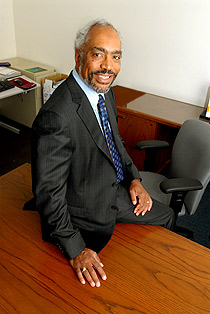Berkeleyan
Gibor Basri starts work as campus's new vice chancellor for equity and inclusion
As the position's first incumbent, he'll ensure that those crucial values are reflected in every top-level management decision
![]()
| 22 August 2007
Gibor Basri, a Berkeley astrophysics professor with an extensive background working on diversity and outreach issues, has been selected as the campus's new vice chancellor for equity and inclusion.
The UC Board of Regents approved the selection on July 19, following the recommendations of Chancellor Birgeneau and his 13-member search committee, which launched a national search to fill the position.
 Gibor Basri (Peg Skorpinski photo) Also: Star hunter: Basri avoids grand rhetoric while thinking big about diversity and the future |
Basri, who was acting chair of the astronomy department during the 2006-07 school year, began serving full-time in his vice-chancellor position on Aug. 13. "My goal," he says, "is to ensure that we bring the best faculty, students, and staff of all backgrounds to Berkeley and provide them with a campus environment in which they can excel and, in turn, help bring Berkeley to new levels of excellence."
As vice chancellor for equity and inclusion, a new position created by Birgeneau, Basri will have oversight of the campus's numerous efforts to recruit, retain, promote - and provide a welcoming environment for - a broad diversity of faculty, students, and staff. There will be an initial concentration in the area of historically excluded ethnic minorities whose current representation is of particular concern.
Basri will have direct responsibility for a portfolio of existing programs and services with an estimated budget of $4.5 million. Such programs and services will involve strengthening academic preparation and academic advancement; providing a diverse campus community with a sense of success and belonging; offering staff members improved career-advancement opportunities; and establishing hiring and recruitment efforts that tap further into the available talent pool of candidates.
The new vice chancellor will also lead fundraising efforts that are expected to produce substantial additional funding for new initiatives. In the coming months he will collaborate with faculty, students, and staff to establish a plan to build on successful existing programs, create new ones, and ensure that clear and measurable goals are met.
A holistic structure
"I am absolutely thrilled that Gibor has agreed to serve as our new vice chancellor for equity and inclusion," said Chancellor Birgeneau in announcing the appointment. "Since arriving at Berkeley I have been extraordinarily impressed by the depth of his commitment and his sophistication in pursuing issues of equity and inclusion. I consider it a privilege to be able to work with him and am confident that I and everyone in the university will learn a great deal from him."
During his inaugural year as chancellor, Birgeneau consulted with a broad group of faculty, students, and staff, and it became clear to him that the campus needed an organizational structure in which issues of equity and inclusion would be addressed holistically - not with various disparate efforts focused on just students, faculty, or staff - with oversight by a high-level administrator.
The chancellor felt strongly that the position should be at the vice-chancellor level to ensure that issues of diversity and inclusion would become part of the culture at the highest level of administration and that equity and inclusion will be part of every decision made at the senior level. He also required that sufficient resources be in place to support the new vice chancellor's work. Basri, as is true of all vice chancellors, will be a member of the chancellor's cabinet; following his consultation with faculty, students, and staff, many existing programs and services will be moved to his unit and fall under his direct oversight.
Looking at complex systems
During his more than 25 years on the Berkeley faculty, Basri, an expert on star formation and stellar activity, has become increasingly involved as a leader on diversity and equity issues. He has served on numerous UC systemwide committees, advisory groups, and councils, including service as ongoing chair of the Faculty Workgroup of the UC Regents' Study Group on University Diversity, a fact-finding committee that is gathering data on the status of diversity efforts post-Proposition 209. The study group will make recommendations to the regents on how to increase diversity among undergraduate students, graduate students, and faculty and provide them with a more supportive campus environment.
At Berkeley, Basri has, among many other things, chaired the campus Academic Senate's Committee on the Status of Women and Ethnic Minorities and served as a member of the Berkeley Diversity Research Initiative Steering Committee, which will bring new faculty to the campus to study such issues as racial inequity in urban public schools and the root causes of disparity in health care.
Basri, 56, was born in New York City and raised in Fort Collins, Colo. He received his bachelor's degree in physics from Stanford University and his doctorate in astrophysics from the University of Colorado at Boulder.
He joined the Berkeley faculty in 1982 and has emerged as a world expert in the study of "brown dwarfs," which are stars without sufficient mass to have a stable brightness and that end up cooling down to planetary temperatures.
"As an astrophysicist, I am used to working with complex systems that only reveal their secrets when looked at from many points of view," said Basri. "They are simple compared with our emerging multicultural society, but making progress based on empirical analysis is what I thrive on."
Basri's wife, Jessica Broitman, is a psychoanalyst in private practice and president of the San Francisco Psychotherapy Research Group Clinic and Training Center. The couple has one son.
Salary information for the new vice-chancellor position is available at www.universityofcalifornia.edu/news/compensation/basri0707.pdf.

